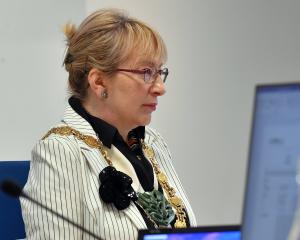The Dunedin City Council argued its case for alcohol restrictions after a supermarket planner claimed its policy was a ''knee-jerk'' response not based on evidence.
Supermarkets, the hotel industry, liquor outlets and police appealed the council's local alcohol policy (LAP) at an Alcohol Regulatory and Licensing Authority (ARLA) hearing at the Dunedin District Court.
The council yesterday made its case for proposed restrictions, which included cutting hours for off-licence stores, including supermarkets, from 7am to 11pm to 9am to 9pm.
Earlier in the day, the last specialist witness for Progressive Enterprises, which owns Countdown and Fresh Choice supermarkets, questioned the proposed restriction on hours of sale.
Planning consultant Michael Foster said it appeared the council had made ''political knee-jerk decisions'' based on the number of submissions, as opposed to introducing restrictions backed by evidence.
Council counsel Bridget Irving said the council had made some ''bold decisions'' after careful consideration of the evidence, which included data showing high rates of alcohol-related harm among the city's young people.
The LAP and the legislation it was based on were not just about minimising harm, but also about changing New Zealand's drinking culture and encouraging safe and responsible drinking, she said.
This could mean making decisions which seemed ''over the top'' now, but which people would likely look back on and say should have been introduced earlier.
The legislation allowed the council to take a precautionary approach which meant it could test initiatives if there was enough evidence to suggest they could work.
Councils did not need to be ''sure'' based on evidence they would work.
''How can we usher in a new system of control if new measures are not tested?''
LAPs were reviewed every six years, which meant initiatives could be removed if they were shown not to work.
She also questioned whether the inconvenience created by not allowing people to buy alcohol between 7am and 9am qualified as unreasonable.
Finally, she asked whether Mr Foster's experience in assisting supermarkets apply for resource consents was relevant in the LAP process.
Under questioning, Mr Foster said no statistical connection had been made to establish restricting the hours of sale would reduce alcohol-related harm.
Instead, it would merely inconvenience a section of customers and ''highly motivated'' drinkers would simply adjust their purchasing habits.
Under questioning from Ms Irving, he questioned a Southern District Health Board report showing high rates of alcohol-related admissions.
There was clearly an issue but the statistics could be ''overdramatised''.
He also questioned why, if the council was relying on the DHB report, it did not follow its recommendation to change licensing hours to 8am and 10pm.
''You can't have your cake and eat it.''
Council liquor licensing co-ordinator Kevin Mechen said Countdown's central Dunedin store was the only off-licence in the store to say no to an initiative aimed at reducing the prominence of glass alcohol products during O Week.
Under questioning by Acting Sergeant Richard Panting, Mr Mechen accepted a proposed 4am closing time for venues with live entertainment could create issues.
ARLA judge Kevin Kelly and members Judith Moorhead and Ross Miller are considering the appeal.
The hearing is set to continue today.
Comments
The council can bang on about "high rates of alcohol-related admissions" all it likes, but this is completely irrelevant to the issue at hand unless it can also show that those admitted to hospital purchased their alcohol between 7am and 9am, or 9pm and 11pm.
The DCC have repeatedly shown their bias as part of the anti alcohol movement. They simply can't be trusted to come up with a balanced approach to the sale of alcohol.













